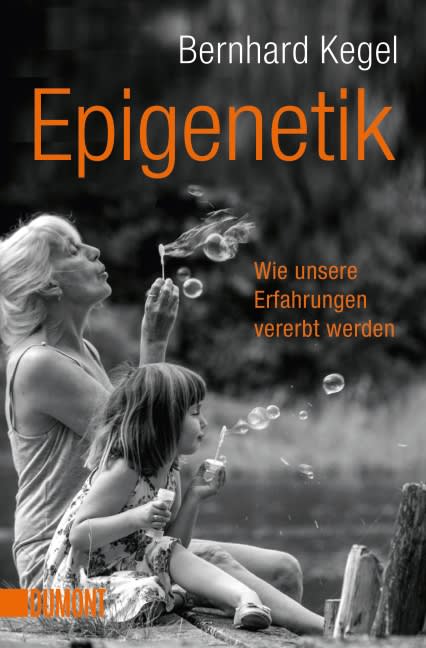

Und es vererbt sich doch ...
BERNHARD KEGEL
EPIGENETIK. WIE ERFAHRUNGEN VERERBT WERDEN /
EPIGENETICS. HOW EXPERIENCES ARE PASSED DOWN
Nonfiction, about 350 pages
new in paperback Spring 2015
“With a pleasant tone and gifted narrative talent, the author allows us to literally experience the colourful goings-on of DNA, RNA and cellular mini- and macromolecules. The general lack of illustrations is only logical. Bernard Kegel richly serves the mind’s eye with metaphors.” Deutschlandradio Kultur
“In his book, Bernhard Kegel passionately presents the principles of epigenetics, for he is convinced that they will revolutionise the biological sciences (...) The easily comprehensible and fluidly written book presents a good introduction to the subject of epigenetics.” Deutschlandfunk
Inheritance is human …
It has been heatedly and emotionally debated in universities and on bar stools: does the environment and experiences affect a person, or solely his genes. The still young science of epigenetics now shows that both are true.
Not only are genes passed down, but also such essential information as when, where and to what extent they must be turned on. The control is carried out by biochemical switches that are not least programmed by environmental influences. Individual experiences thus become a part of the genome’s hardware.
How can the grandparent’s eating behaviour lower the life expectancy of their grandchildren? Why does someone suffer from schizophrenia or cancer while his genetically identical twin does not show any symptoms at all? How can nutrition influence the skin colour of mice and their descendants? And why do early traumatic experiences such as child abuse leave biochemical traces with fatal results in later life, perhaps even over generations?
These are only a few of the questions that Bernhard Kegel’s answers. The biologist with a doctoral degree portrays the far-reaching consequences of epigenetics for medicine and evolutionary biology in an exciting and competent. We become witness of a dramatic theoretical change.
Bernhard Kegel, born in Berlin in 1953, studied chemistry and biology at Freie Universität Berlin, subsequent research activities, worked as an ecological specialist and lecturer. Guitarist in diverse Berlin Jazz bands since the mid-nineteen seventies. His first book, the novel Wenzels Pilz, was published in 1993 and followed by three further novels, most recently Der Rote and the non-fiction book Die Ameise als Tramp. Bernhard Kegel has worked as a freelance writer and science journalist since 1996.
Rights sold to: ddworld Publishing (Korean)
EPIGENETIK. WIE ERFAHRUNGEN VERERBT WERDEN /
EPIGENETICS. HOW EXPERIENCES ARE PASSED DOWN
Nonfiction, about 350 pages
new in paperback Spring 2015
“With a pleasant tone and gifted narrative talent, the author allows us to literally experience the colourful goings-on of DNA, RNA and cellular mini- and macromolecules. The general lack of illustrations is only logical. Bernard Kegel richly serves the mind’s eye with metaphors.” Deutschlandradio Kultur
“In his book, Bernhard Kegel passionately presents the principles of epigenetics, for he is convinced that they will revolutionise the biological sciences (...) The easily comprehensible and fluidly written book presents a good introduction to the subject of epigenetics.” Deutschlandfunk
Inheritance is human …
It has been heatedly and emotionally debated in universities and on bar stools: does the environment and experiences affect a person, or solely his genes. The still young science of epigenetics now shows that both are true.
Not only are genes passed down, but also such essential information as when, where and to what extent they must be turned on. The control is carried out by biochemical switches that are not least programmed by environmental influences. Individual experiences thus become a part of the genome’s hardware.
How can the grandparent’s eating behaviour lower the life expectancy of their grandchildren? Why does someone suffer from schizophrenia or cancer while his genetically identical twin does not show any symptoms at all? How can nutrition influence the skin colour of mice and their descendants? And why do early traumatic experiences such as child abuse leave biochemical traces with fatal results in later life, perhaps even over generations?
These are only a few of the questions that Bernhard Kegel’s answers. The biologist with a doctoral degree portrays the far-reaching consequences of epigenetics for medicine and evolutionary biology in an exciting and competent. We become witness of a dramatic theoretical change.
Bernhard Kegel, born in Berlin in 1953, studied chemistry and biology at Freie Universität Berlin, subsequent research activities, worked as an ecological specialist and lecturer. Guitarist in diverse Berlin Jazz bands since the mid-nineteen seventies. His first book, the novel Wenzels Pilz, was published in 1993 and followed by three further novels, most recently Der Rote and the non-fiction book Die Ameise als Tramp. Bernhard Kegel has worked as a freelance writer and science journalist since 1996.
Rights sold to: ddworld Publishing (Korean)
Rights inquiries
Bernhard Kegel
Bernhard Kegel, born in Berlin in 1953, studied chemistry and biology at the Free University of Berlin, followed by research work, work as an...
Bernhard Kegel, born in Berlin in 1953, studied chemistry and biology at the Free University of Berlin, followed by research work, work as an ecological expert and lecturer. Since 1993 he has published numerous novels and non-fiction books. Bernhard Kegel's books have been awarded several journalism prizes. Most recently, 'Ausgestorben, um zu bleiben' (2018) and 'Die Natur der Zu-kunft' (2021) were published by DuMont. The author lives in Berlin.
